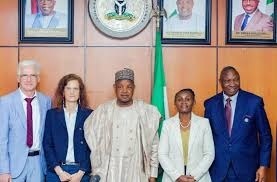Nigeria has secured a €21 million funding commitment from Germany to accelerate its energy transition, renewable energy expansion, and private sector-driven clean energy initiatives.
The agreement was reached during the Working Group on Power, Energy and Climate meeting held in Germany on November 3, 2025, where both countries signed a Joint Declaration of Intent on Bilateral Energy Transition Dialogue and Cooperation.
Under the new arrangement, Germany’s Federal Ministry for Economic Cooperation and Development (BMZ) will provide an additional €9 million to the ongoing Nigeria Energy Support Programme (NESP) in 2024 and €12 million for the newly launched Energy Transition Challenge Fund (ETCF).
Nigeria’s Minister of Power, Adebayo Adelabu, who represented the country at the event, described the commitment as a major step toward building a sustainable, secure, and inclusive energy system that supports national development.
“The financial mechanisms, including the ‘Green Line of Credit’ for our SMEs and the mobilisation of private investment through GET.invest, are critical enablers,” Adelabu said in a statement issued by his Special Adviser on Strategic Communication and Media Relations, Bolaji Tunji. “When combined with the technical expertise now formalised in our Joint Declaration, we are building a comprehensive ecosystem for energy success.”
The Nigeria Energy Support Programme (NESP), jointly implemented by both countries for several years, focuses on expanding access to clean energy, promoting energy efficiency, and supporting regulatory and policy reforms within the power sector. The new funding will scale up renewable energy deployment in underserved areas, especially through off-grid and mini-grid solutions, while stimulating private sector participation.
The Energy Transition Challenge Fund (ETCF), meanwhile, is designed to finance innovative projects that advance Nigeria’s long-term decarbonisation and green growth goals. It will serve as a co-financing platform for clean energy ventures and capacity development for climate-resilient power systems.
Both governments reaffirmed their commitment to ensuring that the partnership delivers tangible socio-economic outcomes for Nigerians, particularly in energy access, industrial growth, and job creation.
The meeting also reviewed progress on the Presidential Power Initiative and underscored the need to deepen private sector involvement in achieving Nigeria’s energy transition targets.
Germany further proposed that Nigeria-Germany Energy Partnership (NGEP) meetings be institutionalised and held annually at the undersecretary level from 2026 to strengthen coordination and accountability bet










